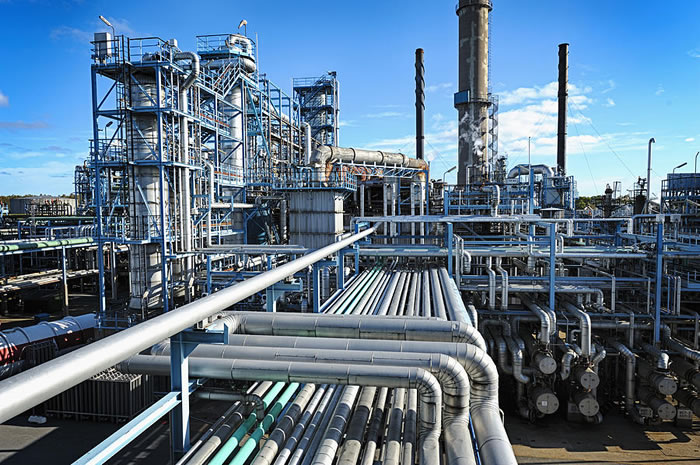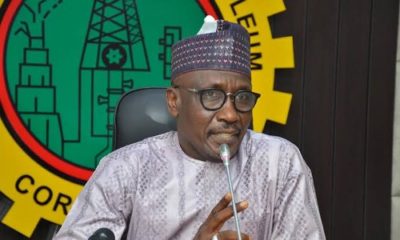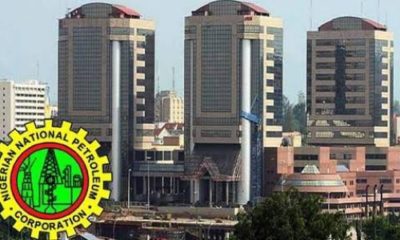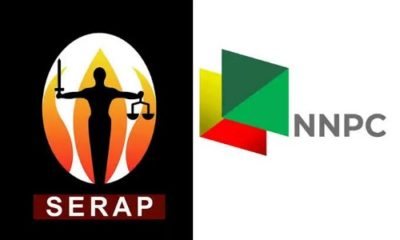Oil
NNPC pledges support for $3.6bn Brass Methanol Plant…as partner takes FID on project

Modupe ASUDO

ABUJA-THE Nigerian National Petroleum Corporation (NNPC) says it would do everything within its powers to ensure the timeous completion of the $3.6bn Integrated Gas Processing and Methanol Plant in Odioma, Brass Island, Bayelsa State.The Group Managing Director of NNPC, Mallam Mele Kyari, made the commitment at the signing of the Final Investment Decision (FID) on the project which held Friday at the Transcorp Hilton Hotel, Abuja. A press release by the Group General Manager, Group Public Affairs Division, Dr. Kennie Obateru, stated that the facility is projected to be the largest methanol plant in Africa and the first in Nigeria. The project is being executed by the Brass Fertilizer and Petrochemical Company Limited (BFPCL), an incorporated entity owned by the Nigerian National Petroleum Corporation (NNPC), DSV Engineering, and the Nigerian Content Development and Monitoring Board (NCDMB).
Speaking at the event, Mallam Kyari, said the Corporation would do everything possible to make the project come to fruition, noting that NNPC was pleased with the current efforts by the Federal Government to provide value for Nigeria’s gas resources. Describing the FID as one of the most significant FIDs in recent times, Kyari said the project was in tandem with the earlier declaration of 2020 as the year of gas and 2021-2030 as the decade of gas by the Minister of State for Petroleum Resources. He remarked that the construction phase of the project would create about 30,000 in addition to the 5,000 permanent jobs which would come in place when the plant becomes operational.
Earlier in his welcome address, the BFPCL Board Chairman, who is also the NNPC Chief Operating Officer, Gas & Power, Engr. Usman Yusuf, disclosed that already a lump sum Turnkey Engineering, Procurement and Construction (EPC) contract has been awarded to the China Tianchen Engineering Corporation (TCC) while TATA Consulting Engineers are providing project management consultancy for the delivery of the plant in 2024. “In 2017, BFPCL secured an Initialled Gas Sales and Purchase Agreement (GSPA) with SPDC JV for a 25-year supply of 270MMscf/d rich gas to the project. T
he integrated project is estimated to cost about USD3.6 billion and is expected to deliver 10,000TPD Methanol products to the export and local markets,” he stated.In his presentation, the Executive Vice-Chairman of BFPCL, Mr. Ben Okoye, said the signing of the FID was an affirmative vote and consent by the Board to construct the plant. He explained that with a production capacity of 10,000 tons per day (tpd), the facility would be the largest methanol plant in Africa with a huge potential to provide gainful employment many youths both at the construction and operational stages.
Okoye informed that based on lessons learnt from the historic checkered relationships between host communities and oil and gas companies, the project would allow for host communities to have equity shareholding participation to give them a sense of belonging.
Speaking at the event, the Minister of State Petroleum Resources and Alternate Chairman of the NNPC Board, Chief Timipre Sylva, said the FID marked yet another milestone in the ongoing efforts to monetize and add value to the nation’s abundant natural gas endowments. He noted that in July 2020, President Muhammadu Buhari approved the development of the Brass Gas Hub with the sole aim of aggregating and monetizing all stranded gas in the Brass area which amounts to over 14 trillion cubic feet. “Today we are witnessing the signing of the Final Investment Decision of Phase 1 of the Brass Gas Hub by the promoters of this laudable project.
The project is expected to have very significant economic impact on the country including but not limited to support for gas based industries, revenue generation, import substitution for the methanol needs of the country that is currently 100 per cent imported, among others’’ the Minister said. While assuring the BFPCL of government support, he called on the company to ensure timeous completion of the project.
Oil
NNPC Discovers Over 4,800 Illegal Pipeline Connections

The Nigerian National Petroleum Company (NNPC) Limited has revealed the detection of more than 4,800 unauthorized connections on oil pipelines within the country, painting a troubling image of the nation’s primary source of revenue.
Mele Kyari, the Group Chief Executive Officer of NNPC Ltd, communicated this information to the Senate Committee on Appropriations last Friday.
He said, “We have over 4,800 illegal connections on our pipelines. That means in some lines, within 100 kilometres of pipelines, you have as much as 300 insertions.
“Therefore, even when you produce the oil, you cannot deliver them at the required pressure and therefore the volume will also be less.”
As per the NNPC Ltd chief, individuals from various regions enter the Niger Delta, inserting unauthorized connections on pipelines in Nigeria’s oil-producing area.
This recent revelation follows a prior discovery of 295 illegal connections to the pipelines by the firm a year ago, underscoring the escalating issue of crude oil theft in Nigeria.
Two years earlier, Kyari had highlighted the country’s daily loss of 200,000 barrels of oil, amounting to $13 million due to theft and vandalism.
He further stated “We have two sets of losses, one coming from our products and the other coming from crude oil. In terms of crude losses, it is still going on. On the average, we are losing 200,000 barrels of crude every day.”
After the discovery, Nigeria’s security forces pledged to enhance security around the country’s pipelines.
To bolster this, the Federal Government granted a multi-billion naira pipelines surveillance contract to Tantita Security Services, headed by former militant leader Government Ekpemepulo, also known as Tompolo.
Despite facing criticism for this decision, Senator Heineken Lokpobiri, the Minister of State for Petroleum, remains convinced that it was the appropriate course of action.
In August, following a tour of oil facilities in the Niger Delta, Senator Heineken Lokpobiri expressed gratitude to Tantita, commissioned by NNPC Ltd, for their ongoing work.
He also hinted at plans for further extensive endeavors in the future.
In 2021, after extensive debate and delays, the Petroleum Industry Bill was finally passed to attract increased foreign investment into the oil sector through amendments to regulations, royalties, and taxes.
Oil
Dangote Refinery Set To Begin Fuel Production With First Crude Arrival

Nigeria’s colossal $19 billion Dangote Refinery, after encountering several setbacks, is on the verge of kickstarting fuel production.
This achievement is heralded by the arrival of the first crude shipment, transported by the OTIS tanker carrying 950,000 barrels of Nigeria’s Agbami crude.
S&P Global, citing industry sources and tanker tracking data on spglobal.com, reported the tanker’s departure on December 6, en route to Lekki, the nearest land port to Dangote’s offshore crude receiving terminal.
Scheduled to reach its destination around 8 PM on December 7, the arrival of this shipment signifies the commencement of crude supplies for the refinery’s operations.
Chartered by the state-owned Nigerian National Petroleum Company (NNPC), the Suezmax tanker is an emblem of the initial crude supply to Dangote’s cutting-edge refinery, as disclosed by a West African oil trader familiar with the matter in the S&P report.
Even though the refinery was officially completed in May, the absence of domestic crude feedstock had hindered oil product manufacturing.
To address this, the NNPC, holding a 20% stake in the refinery, struck an agreement to provide 6 million barrels of crude oil as feedstock to the Dangote refinery in December.
This move aims to jumpstart operations and overcome the previous impediments.
Agbami, operated by Chevron, holds a prominent position among Nigeria’s major deepwater developments, producing around 100,000 barrels per day in the central Niger Delta.
Known for its light sweet crude qualities, with a specific gravity of 47.9 API and a low sulfur content of 0.04%, Agbami produces substantial amounts of naphtha and kerosene.
NNPC has chartered additional shipments from different Nigerian offshore fields to the refinery, marking the start of a sequence of planned crude supplies for the month, as mentioned by the oil trader.
Located on the outskirts of Lagos, Nigeria’s commercial hub, the Dangote Refinery encountered repeated delays since its 2013 announcement, despite significant installation progress in 2019.
The refinery, designed to handle multiple crudes simultaneously, targets three Nigerian crude grades—Escravos, Bonny Light, and Forcados. When operating at full capacity, it aims to produce 327,000 barrels per day (b/d) of gasoline, 244,000 b/d of gasoil/diesel, 56,000 b/d of jet fuel/kerosene, and 290,000 metric tons per year of propane/LPG.
Dangote’s operations starting signify Nigeria’s hopes to lessen its reliance on gasoline imports, addressing the deficiencies of its existing refineries undergoing repairs. This shift is poised to reshape Nigeria’s oil industry, potentially leading to gasoline self-sufficiency by the 2040s.
Dangote officials anticipate an initial output of 370,000 barrels per day (b/d), emphasizing jet fuel and diesel production.
Industry analysts, however, project the refinery to reach its full operational capacity by mid-2025, although potential delays remain a looming concern.
Oil
NNPCL Sets Dec 2024 Terminal Date For Fuel Importation

The Nigerian National Petroleum Company Limited (NNPCL) has announced intentions to cease importing refined petroleum products by December 2024, anticipating full operational functionality for all national refineries by that time.
Group CEO, NNPC Ltd, Mele Kyari, shared this at a meeting with Speaker Tajudeen Abbas of the House of Representatives, who advocated for the privatisation of Nigeria’s refineries on Thursday.
Projections indicated the national oil firm’s revenue could climb to N4.5 trillion by the conclusion of 2023. Moreover, the rehabilitation of the Port Harcourt Refining Company, managed by NNPCL, was slated for completion by December of the current year.
Meanwhile, Oil marketers verified on Thursday that the Port Harcourt refinery is set for operations, potentially starting in January 2024. They emphasized that once operational, this refinery could notably reduce the prices of refined petroleum products.
During the meeting in Abuja, Kyari asserted Nigeria’s intention to cease importing refined petroleum products by 2024, envisioning the country’s emergence as a net exporter of these commodities within the same year.
He outlined the plans for launching operations at the Port Harcourt, Warri, and Kaduna refineries.
Kyari reiterated that all refineries would operate at full capacity, ultimately paving the way for Nigeria to transition into a net exporter of petroleum products by the conclusion of 2024.
He attributed the inactivity of Nigeria’s refineries over the years to the petroleum subsidy, emphasizing that the removal of this subsidy was drawing significant private-sector investments into the sector.
Kyari said “I can confirm to you that by the end of December this year, we will start the Port Harcourt refinery; early in the first quarter of 2024, we will start the Warri refinery and by the end of 2024, Kaduna refinery will come into operation.
“This is the commitment we are giving today and you can hold us accountable for this. In 2024, many of the initiatives including the rehabilitation of our refineries and also the efforts of small-scale refineries, and the upcoming Dangote refinery, will make Nigeria a net exporter of petroleum products in 2024.
“We will no longer be talking about fuel importation by the end of 2024. I am very optimistic that this will crystallise.
Kyari promised that by the conclusion of 2023, the government’s anticipated revenue from the company would reach N4.5 trillion, emphasizing NNPCL’s adherence to the Petroleum Industry Act and its commitment to delivering value to shareholders.
Recall that in October 2023, it was reported that Nigeria’s monthly spending on the importation of Premium Motor Spirit, known as petrol, had reached approximately N843 billion due to NNPCL’s cessation of oil swaps.
In July of this year, the Nigerian Midstream and Downstream Petroleum Regulatory Authority reported that during the post-deregulation period, spanning June 1 to June 28, 2023, the country’s total petrol consumption amounted to 1.36 billion litres, with an average daily consumption of 48.43 million litres.
The average ex-depot price of petrol, sourced solely from NNPCL as the importer, stands at about N580 per litre.
However, both NNPCL and oil marketers declared on Thursday that this substantial oil import expenditure would soon diminish.
They anticipated a drop once the Port Harcourt refinery commences production of refined petroleum products from January 2024, barring any unforeseen circumstances.



















